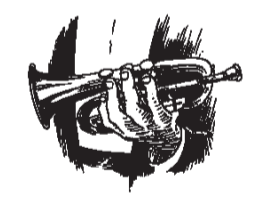The Union Sons Hall stood at 1319 Perdido Street, between Liberty and Franklin, in the area of New Orleans known in the late nineteenth and early twentieth centuries as Back o’ Town, which was among other things the unofficial black prostitution district, as distinct from the official white one, Storyville, a few blocks away. The hall was built sometime after 1866, when several “free persons of color” formed the Union Sons Relief Organization of Louisiana and bought a double-lot parcel for its headquarters. The only known photograph of the place was taken in the 1930s, a decade or so after it had become the Greater St. Matthew Baptist Church, and by then it certainly looked like a church, although this being New Orleans it is not impossible that it always had a steeple and Gothic arched windows. Anyway, it was a church on Sunday mornings for much of its existence, originally leased to the First Lincoln Baptist Church for that purpose. On Saturday nights, meanwhile, it was rented for dances which lasted until early light, so that the deacons must have put in a hard few hours every week washing up spilled beer and airing out the joint before the pious came flocking. At night it was known as one of the rougher spots in a rough area. It was razed in the late 1950s, along with most of the immediate neighborhood, its site now lost somewhere under the vastness of the Louisiana State Office Building.[1]
It is remembered solely because of those dances, and primarily because some of them featured Buddy Bolden and his band. Jazz is too large and fluid a category of music to have had a single eureka moment of origin, let alone a sole inventor, but just about everybody agrees that no nameable person was more important to its creation than Buddy Bolden. He was a cornet player, born in 1877, and he got his first band together sometime around 1895. He was known for playing loud—stories of how far his horn could be heard sound like tall tales, but are so numerous there must be something to them—and for playing loose and rowdy. He was by all accounts the first major New Orleans musician to make a virtue of not being able to read a score. You can begin to get an idea of how distinctive his band was from looking at photographs. The traditional-style brass bands of the era wore military-style uniforms, complete with peaked caps, as their parade-band successors do to this day; the getups proclaim unison and discipline, even if the New Orleans version allowed for more latitude than was the rule among the oompah outfits active in...
You have reached your article limit
Sign up for a digital subscription and continue reading all new issues, plus our entire archives, for just $1.50/month.
Already a subscriber? Sign in





